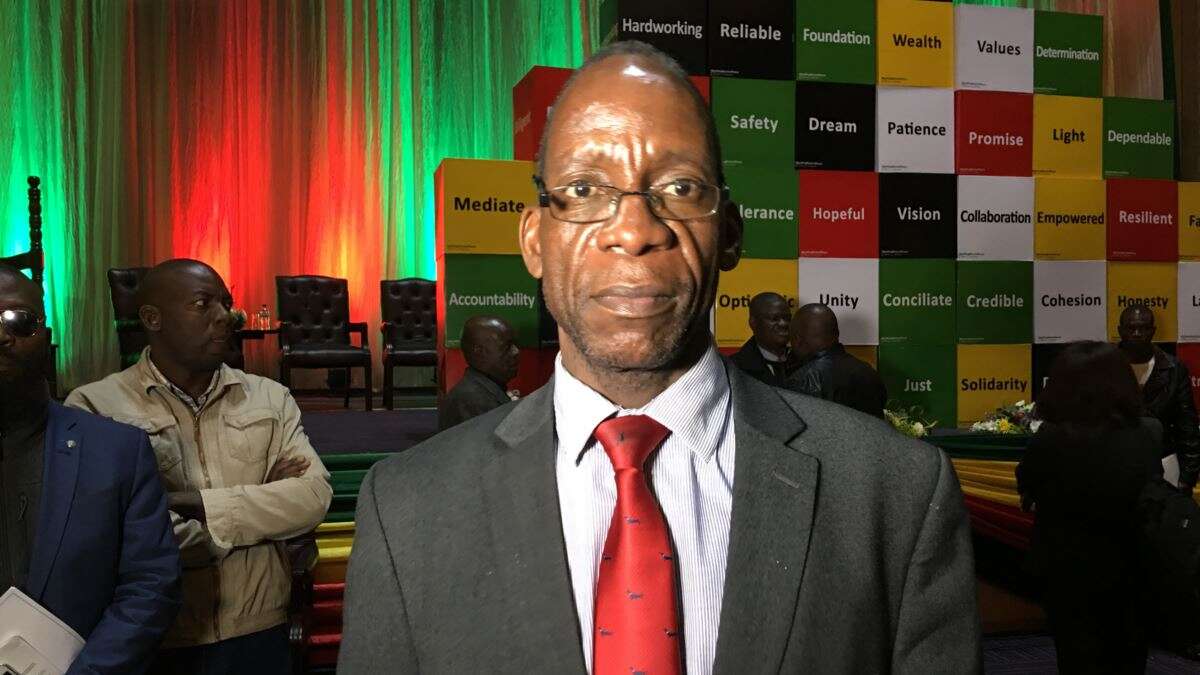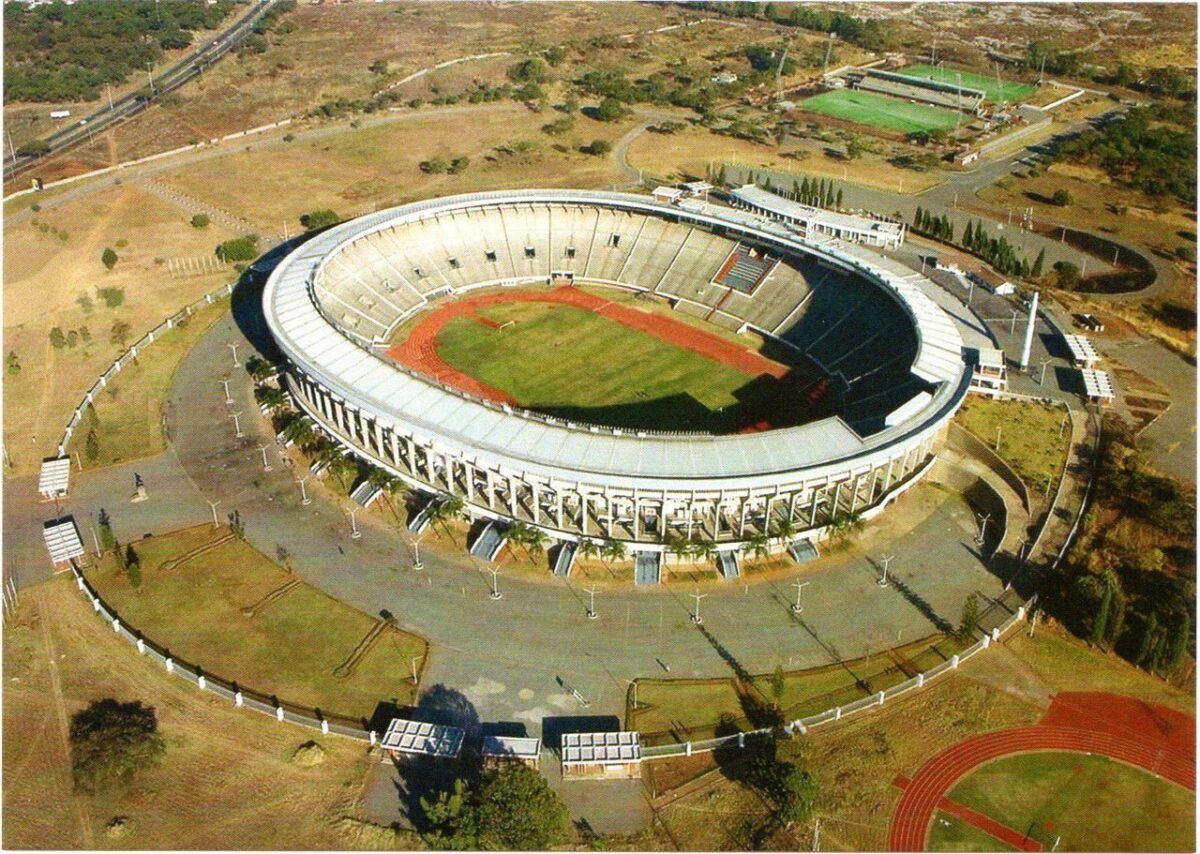Constitutional law expert and leader of the National Constitutional Assembly political party Professor Lovemore Madhuku spoke to reporters on May 12, 2020, about Constitution of Zimbabwe Amendment (No. 2) Act which recently became law.
Madhuku was critical of the aims of the constitutional amendment and warns that President Emmerson Mnangagwa is much more power hungry than his predecessor Robert Mugabe, and will stop at nothing in his pursuit of acquiring power, and consolidating it. Here is what he had to say:
I will make four points on behalf of the National Constitutional Assembly (NCA). Our first point as the NCA is that we are condemning the enactment of Constitution of Zimbabwe Amendment (No. 2) Act. We are condemning the amendment of the constitution in the manner that it happened.
The reason we are condemning the amendment is very clear, we have two grounds that are very solid. The first one is that the amendment is not a people-driven process which is contrary to what a constitution must do. The making of a constitution must be by the people, its amendment must also be by the people. So, both the process of making a constitution and its amendment must be people-driven. This did not happen.
The amendment process was purely and exclusively driven by Zanu PF as a ruling elite, by Zanu PF as a political party and Zanu PF politicians.
The second ground why we are condemning the amendment process as NCA is that it was done contrary to very solid and overwhelming public opinion against it. So, apart from the fact that Zanu PF did it single handedly and for its own purpose, there was overwhelming public opinion against it.
As NCA, we have evidence of that public opinion against it: we are members of the Political Actors Dialogue (POLAD), and within POLAD there was a lot of discussion around Constitution of Zimbabwe Amendment (No. 2) Bill then. The position that was adopted in POLAD was that this Bill must be withdrawn, that there must be further consultations to ensure that you actually only amend the constitution to address other concerns that would address electoral reforms ahead of 2023.
At one point we got some understanding that the bill would not be pursued, and we were out in the public domain praising that stance that had been taken within POLAD. Unfortunately, that did not happen.
The POLAD one is just one example of public opinion, but we also know that there was a public consultation by parliament where the report of the parliamentary portfolio committee showed that a majority of Zimbabweans who were consulted said “no” to the amendment process. It was clear that there was overwhelming public opinion against going ahead with the amendment.
Our second point as NCA is that we notice in the amendment that the content is extremely dangerous for the country. It is a continuation of what is already in the constitution where power is consolidated in the president, but what is even more dangerous in respect of this amendment is that it personalises that consolidation. It is very clear that power is now being concentrated not in the hands necessarily of an office, but of an individual who is in office and that is a very dangerous approach.
The debate on the running mate clause being removed, the debate on the power to appoint judges or to extend the term of judges and so forth… it is all about the personal love for power by President Emmerson Dambudzo Mnangagwa, and this is what is reflected in the amendment. As NCA, we notice a very dangerous trait in Amendment No. 2, it takes it a level above what we are used to.
We have been in this game to say that we need a people-driven constitution and at one point we were dealing with President (Robert) Mugabe and some people thought it was all about Mugabe. What has happened with Amendment No. 2 is that the current president has gone much beyond what President Mugabe was doing in terms of loving power as a person, and concentrating it. It shows the trait where the president came out in a video and was recorded as saying “2030 ndinenge ndichipo” (2030 I will still be here) – this is what Amendment No. 2 is all about, we are noticing that this is actually what’s happening. It’s a dangerous trait and we have to call upon Zimbabweans to be alive to that process because there is no other reason why the president will ignore every other advice that he was given.
If you look at that amendment, there’s this thing that is actually creating a lot of problems, where the constitutional amendment is put in place just days before the retirement of the Chief Justice (Luke Malaba). The message being put across to the public is that there would be certain individuals, certain persons who are more important than others, in other words they could be such unique individuals that the country cannot do without. We find that a very dangerous trait.
We respect the Chief Justice and the work that he has done, but we don’t believe that this is a time where individuals can say to the world, “I’m so crucial, you cannot do without me and so I would accept a personal extension of a term of office via a constitutional amendment.” That’s very dangerous. The boast that “2030 ndinenge ndichipo” might actually mean that there is a target to amend the constitution again.
Our third point as NCA is what we believe is the way forward for Zimbabweans. We have an NCA approach which we call upon Zimbabweans to embrace and to understand, and it is that constitution-making is a political issue. Zimbabweans must engage with this issue politically, meaning we engage in a debate that this is not right, this is not fair, this is unjust. Our debate must focus on that and we go down to all people to make them understand that what has happened is bad.
What has happened confirms the NCA fear in 2013 when we campaigned for a no vote because of our belief that a constitution must never come from politicians, it must never come from the ruling politicians. This amendment and the way it happened shows that we were right after all, we are still right and the debate must be more about engaging people on the goodness and the badness of the amendment – that’s what politics is: “This is bad, this is unacceptable; this is bad, this is unacceptable.” We debate it that way. That debate is very different from a debate that says, “this is legal, this is illegal; this is constitutional, this is unconstitutional”. Such a debate is good, but it must not be the primary debate for the country because such a debate will focus it on lawyers and those who understand what is legal and what is illegal, what is constitutional and what is unconstitutional.
We call upon Zimbabweans to take the debate at a higher level and say this is bad what has happened, and we all agree that it is bad. We cannot just change the constitution the way it was done. That will be the NCA; in our approach we will politicise it, we will continue to criticise the Zanu PF approach, we will continue to do it in all platforms and we will go down to the people to mobilise.
As NCA we support the initiatives by other Zimbabweans who have a different view on how to approach this issue. Other Zimbabweans have their own approach and we respect that. Our approach is let’s politicise the matter, let’s go out there and tell ordinary people so that they become part of the debate. It must not become a social media, an elite or clan debate. That’s our approach, but we realise that other Zimbabweans have another approach and that approach is to go to court and challenge these things, we support those approaches. We are not here to say that strategy does not work.
Finally, number four, does this affect the NCA’s participation in POLAD? The NCA will remain in POLAD. We failed on Constitutional of Zimbabwe Amendment (No. 2), and that is done. But we don’t believe that we will fail in other initiatives that are on the agenda. We had two items on the agenda. The first one was on the constitution-making process which was a governance issue. We did everything, we mobilised other members in POLAD and they accepted our viewpoint but Zanu PF pushed it out and we failed.
The second thing was on electoral reforms ahead of 2023. There is already an Electoral and Political Parties Amendment Bill that is being discussed within POLAD with a number of reforms within the proposed Electoral Amendment Bill and the proposed Political Reforms Bill. We will remain there for the purposes of ensuring that that attempt is exhausted. We don’t support the view that when you are disappointed on one, then you throw away everything else. There are Zimbabweans out there who might not take that view, but that’s our view.
















